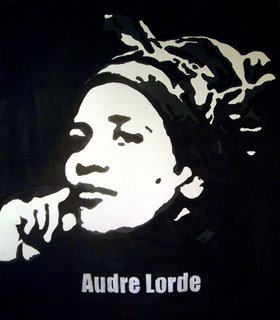By: Mary Beth
The erotic is defined by the dictionary as arousing or satisfying sexual desire. Yet, for black lesbian poet, Audre Lorde, it meant something more. Instead of thinking of the erotic as "an easy, tantalizing sexual arousal," she spoke of it as "the deepest life force, a force which moves us toward living in a fundamental way." From her perspective, the erotic was a deeply female phenomenon, which in turn, due to it's femininity, is largely repressed. Lorde's feminist ways urged her to rid repression of the erotic and to celebrate it as a way to deeply feel all aspects of life.
She condemned the fact that the erotic had been taken out of all female aspects of life besides sex. She realized this was because "empowered women are considered dangerous." So now, my question to Lorde is, in what areas of life, excluding that of sex, are men erotic?
Lorde, being a black feminist, made sure to expose her position in society every chance that she was given. She took the position that being black not only made her inferior, but that being a woman denied her the right to "feel, love, and touch the erotic."Yet, the social construction of masculinity within society has also made is uncustomary for men to feel strong emotions such as love, and to act out such feelings with affection. Instead, they are expected to be strong and unmoved.
For me, Lorde's argument pertaining to the erotic did not hold up. The erotic is a phenomenon that has been repressed for both sexes. She acknowledges that the erotic is deemed solely a sexual phenomenon for women, yet, does not make an argument that it is anything else for men. Protestant culture throughout history has led eroticism to be repressed for both men and women throughout history, and racial and anti-sexist agendas should not overlook that fact.

No comments:
Post a Comment